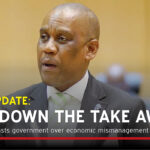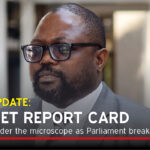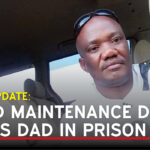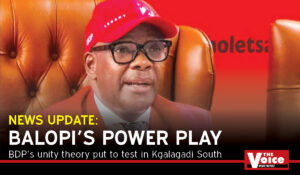MPS PREPARE FOR JULY SITTING
Although government is yet to release the dates for the July Parliament sitting, there is a strong feeling from within the government enclave that it will be called in two weeks time.
With the nation still under State of Public Emergency and following the Covid-19 regulations, it will be interesting to see how the sitting will convene.
Since the recent introduction of live broadcasting of the house proceedings there has been great interest from the public in following the events as they play out. People can now see for themselves exactly how their representatives are performing, unlike in the past where they were solely reliant on media reports.
For the Members of Parliament there is nowhere to hide!
The Voice Staffer, DANIEL CHIDA caught up with a number of MPs to get an idea of what to expect in the coming sitting.
Wynter Mmolotsi – MP for Francistown South
The July parliament is normally for making and amending laws. This year it comes at a time when the world and country are affected by the Covid-19 pandemic. This calls for us to originate laws and policies that will be relevant to the current situation.
Covid-19 has exposed Botswana’s vulnerability and because of that we need to address those vulnerabilities especially those related to dependence on other countries for almost everything.
We need to promulgate laws and policies that talks to new ways of producing energy and fuel especially coal liquefaction.
We need to formulate policies that will empower Batswana to produce sufficient food for themselves and for the nation so that in future we do not find ourselves in the same situation.
This July, [expect to] specifically see parliament amending the Health act with a view to strengthen it for future pandemics. We cannot afford to have a state of emergency each time we are faced with a pandemic.
I also believe that we are at a point where the state of emergency can be lifted and I hope parliament will lift it and allow the public health director to use his powers to combat Covid-19.
Dithapelo Keorapetse – MP for Selibe Phikwe West
I expect MPs to probe matters concerning Covid-19 related decisions particularly on procurement. MPs should ask questions relating to dubious and seemingly fraudulent Covid-19 tenders and dealings.
They ought to hold the executive to account on health related decisions. The Task Force is only accessible through the executive, Parliament should make them accountable.
The biggest work for Parliament is development issues: the economy has declined, firms closed or undergoing through problems, jobs have been lost, and government revenue has seriously plummeted. NDP11 cannot be fully implemented.
Midterm review is due but will obviously change, Parliament therefore should scrutinize executive priorities. It must specifically guard against misplaced priorities that don’t add any meaningful value to the economy.
Priority must be on jobs generating or wealth generating projects and programs. Programs aimed at buying votes but not necessarily adding value should stop. Spending of useless things must stop.
Parliament must frankly evaluate the recovery strategy to see if indeed it’s just rhetoric or serious stimulation of the economy.
How the country moves forward after Covid-19 scourge should be shaped by the July session. We are still under State of Public Emergency, so it is still unclear if Parliament will be convened soon. No communication has been made to MPs.
Carter Hikuama – MP for Ngami
We have been hearing a lot about the government on transformation agenda with little or no evidence on the ground.
My wish is to see ministers coming up with bills/ policies gearing towards transformation. Government must move on its commitment to fight poverty and rural development especially provision of portable water to rural communities.
There is need to kick-start the constitutional review process which is long overdue and we keep being told is on the table.
And lastly I also hope to understand how far the Ministry of Agriculture and Rural development is on the Botswana Meat Commission’s turnaround process as well as the establishment of meat regulator in the country, among other things.
Molebatsi Molebatsi – MP for Mmadinare
What we have in mind is the community’s blueprint for the intentional actions it will take to influence the direction and pace of its development.
We call this blue print a Local Economic Development (LED) strategy. If we get it right, it should guide capacity development for community development structures, coordinate stakeholder engagement on the development of the village, define our strategy map and the actions we will pursue to realise our vision and objectives.
I know it sounds too conceptual but the bottom line is this is what you need to build a community that has the capacity to drive its own development.
The government is rolling it out nationally and hopefully it will all get clearer when we meet and discuss it as we go on.
We should also perhaps adopt a two-track approach to the LED process. The first of course is LED strategy and the second would be picking the low-hanging fruit.
As long as we understand the patterns of demand in the region (and beyond) and how we link to specific value chains) we should be able to package (at a rudimentary level) and sell a number of projects to investors.
I like the fact that we are all looking at value chains our people are already part of.
Baratiwa Mathoothe – MP for Serowe North
We have been told that this financial year 2020/2021 there won’t be any funds allocated for community constituency projects.
These funds are the ones that we use to create income-generating projects to create jobs for the constituents through: farming, tourism, creative arts and manufacturing.
Ipelegeng has been suspended too and we have to request government to rescind their decision to suspend it because it was acting as a relief to the unemployed.
On Citizen Economic Empowerment bill, we want the government to allow us to consult our constituents so that they can have an input.
We are looking forward for the government to come out with economic reforms more so that we focus on agriculture and health issues.




















